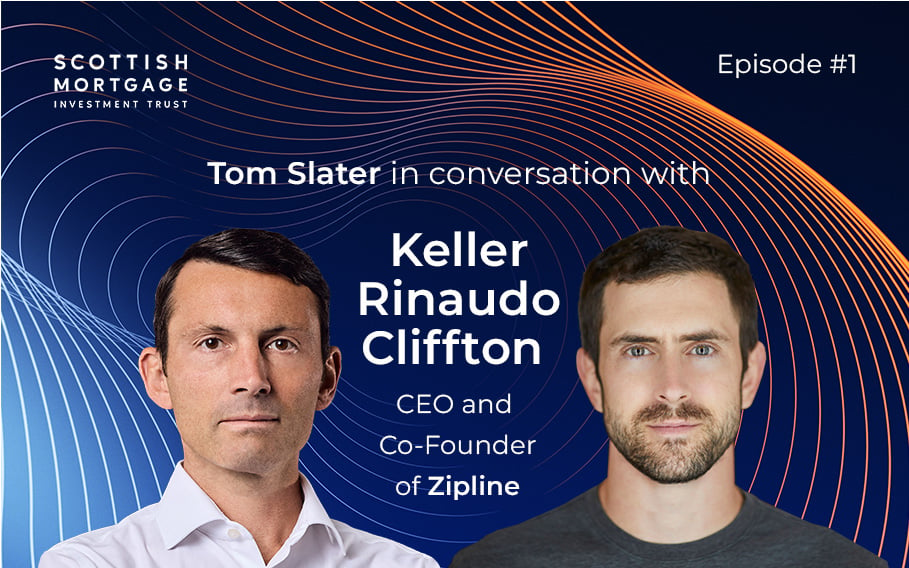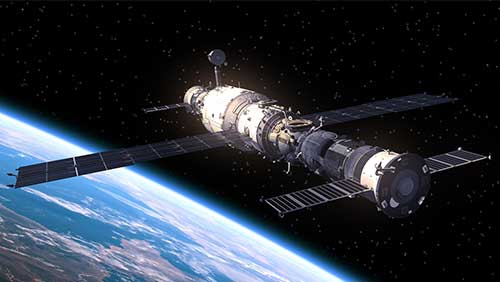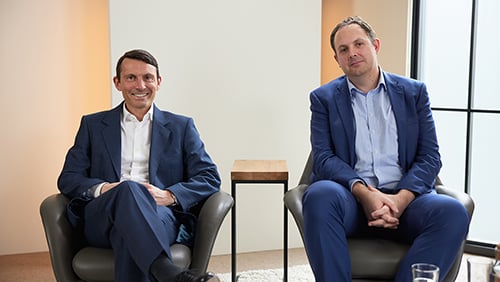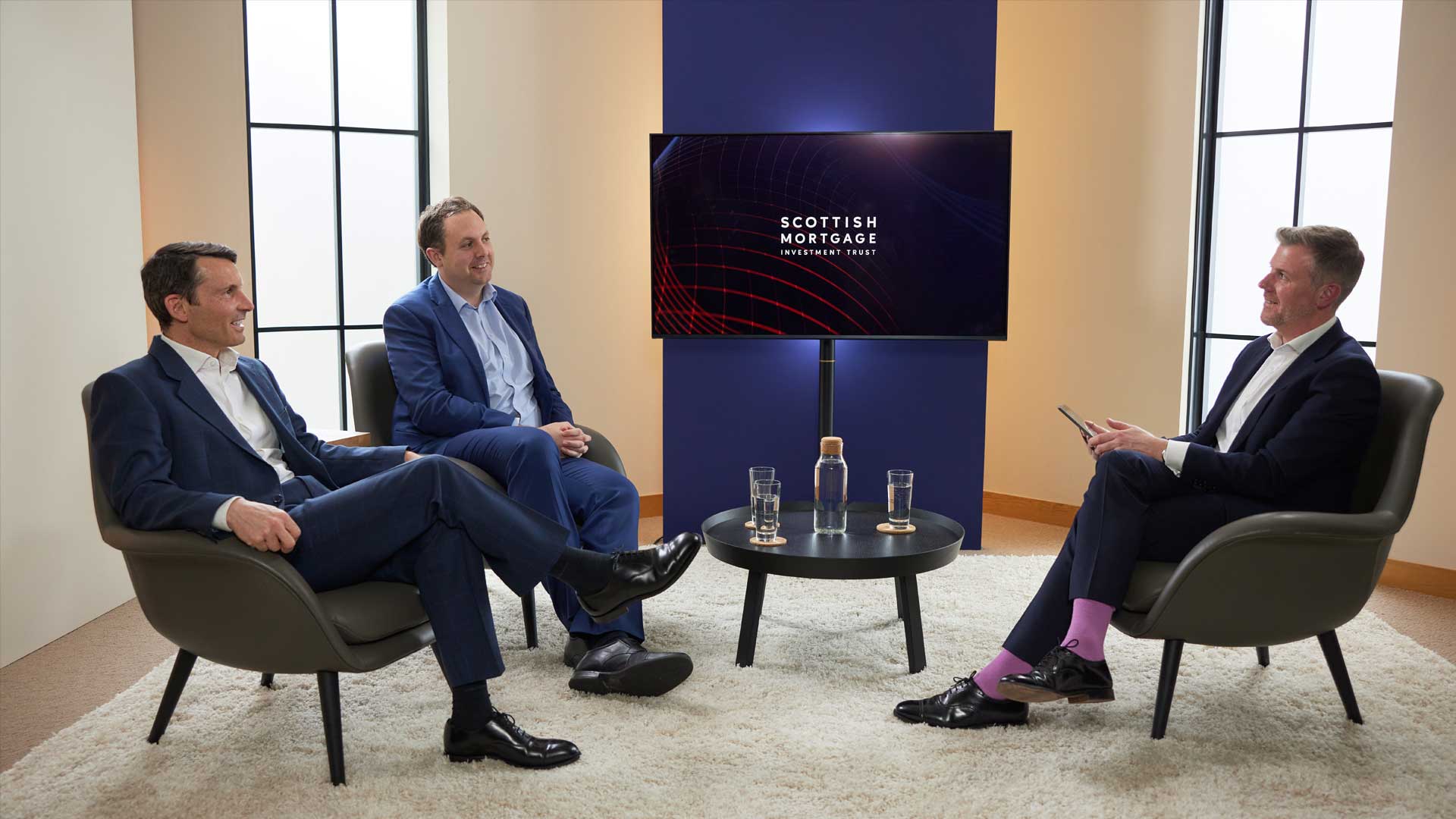January 2023
Article
5 minutes
Zipline: drones taking flight to save lives
Claire Shaw – Portfolio Director
Key points
- Zipline founder Keller Rinaudo Cliffton explains how the firm’s drones are saving lives all over Africa
- Autonomous drones powered by rechargeable batteries make deliveries cheaper, faster and zero emission
- Listen to the podcast to hear how the company is rolling out a logistics system for one of the world’s biggest retailers, Walmart

This article is a teaser for the Scottish Mortgage Zipline podcast. Having built the world’s first 24/7 autonomous delivery service, Zipline’s drones save lives by delivering medical supplies within minutes. But that’s just the starting point. You can hear directly from Zipline founder Keller Rinaudo Cliffton about his vision of creating a model of logistics that reaches everyone, everywhere here.
As with any investment, capital is at risk.
Zipline’s founder Keller Rinaudo Cliffton is used to people not believing him. When he founded the drone delivery service in 2014, investors and experts in global health alike told him he was foolish. They didn't think his vision of ‘instant logistics’ – building the world’s first automated, on-demand logistics system to serve all humans equally – was achievable.
Cliffton recounts:
The technology wasn’t going to work. Even though the technology worked, we would never get regulatory approval. Even if we could get regulatory approval, there was no chance that a country would pay us money to do this.
But his small team, with their backgrounds in robotics, software and automation, thought differently. Ignoring the experts, they focused on working directly with governments prepared to give Zipline the time and space to make it happen.
“Rwanda,” says Cliffton, “by virtue of being a small country, very technology forward, innovative, willing to try new things and make decisions quickly”, was an excellent place to start.
His tenacity and perseverance are already paying off and saving lives. And healthcare systems and large corporations across the globe are sitting up and taking notice.
Solving the problems too big for the world’s largest businesses
If it’s said that good things come to those who wait, the number of delivery vehicles on our streets suggests that fewer people believe it. We want items to appear as soon as we have ordered them.
That distracts from the fact that only the wealthiest people on earth – the golden billion as they’re sometimes known – have access to logistics. And that’s costing lives.
Cliffton highlights the, “five-and-a-half million kids under the age of five who lose their lives every year due to lack of access to basic medicinal products”.
Those families, and the healthcare systems providing them, are unlikely to care about the software, control algorithms, ground equipment or regulatory approvals behind Zipline’s automated drone technology.
What’s important is the millions of vaccine doses, infusions, blood transfusions, cancer products and insulin being delivered by autonomous delivery drones within minutes of a nurse or doctor requesting them.
At the outset, Rwanda proved a perfect “partner” and testing ground for the company. Cliffton remembers offering to deliver all medical products to every primary care facility and hospital in the country to its Minister of Health. He says, “She looked at me and said, just do blood.”

Enjoy investment manager Tom Slater’s entire conversation with Keller Rinaudo Cliffton on the Scottish Mortgage podcast. Hear how Zipline is creating universal access to healthcare and other goods by building a new delivery paradigm, and why Zipline deserves its place in the Scottish Mortgage portfolio as it scales its ability to deliver the things you need when you want them.
And for the first nine months, that’s precisely what Zipline did. Except it was only for one hospital.
Cliffton humbly admits it was “a total logistics nightmare” and “way harder than they were expecting”. The company had to factor in the different storage requirements and shelf lives of blood cells, platelets and plasma and replicate this across the blood types.
Today, with over 35 million commercial autonomous miles under its belt, Zipline delivers medical supplies and 67 per cent of the blood to Rwanda’s 450 primary care facilities and hospitals. It supplies 7,000 hospitals and health facilities worldwide.
Zipline’s secret weapon
From an outsider’s perspective, you might assume Zipline’s competitive advantage lies in its small, automated electric aircraft, weighing about 22 kilograms, that can fly 300 kilometres on a single battery charge and deliver products from the sky onto the ground with the precision of two parking spaces.
Cliffton disagrees. He suggests that being “scrappy, frugal problem solvers” is in the company’s DNA and aircraft technology only represents 15 per cent of the complexity they have had to solve in real-time to build a cutting-edge logistics system.
While the company’s product vision is to approximate teleportation, Cliffton confirms, “a huge part of our mission is just that we think that everybody deserves universal access to healthcare”:
I think a lot of people are sick of this paradigm of technology companies being evil and destroying democracy. Many people want to be part of something they can tell their grandkids they created from scratch [to solve these kinds of problems]. And so, I think our mission has been our secret weapon in competing against much bigger companies.
Developing the infrastructure has become a source of national pride in many countries Zipline has launched in. It has always hired entirely local teams, whom Cliffton points out, “are doing what some of the richest technology companies on Earth have tried to do and failed.”
It’s clear from what Cliffton says that fashioning a new kind of global logistics network that is automated, zero emission and 10 times faster than any other delivery form does not phase him. Zipline’s partnership with Walmart in the US demonstrates that once you offer this service for health and wellness products, customers expect everything else to be delivered within the same timeframe (minutes rather than hours) and to-the-door convenience. As we expand on in the podcast, from the starting point of delivering blood in Rwanda to dropping off rotisserie chickens and birthday cakes in the US, drone delivery has the potential to take a significant share of the global logistics network. If the company succeeds, it will tremendously impact humanity, facilitating universal access to healthcare products and everything else.
About the author - Claire Shaw
Portfolio Director
Claire Shaw is a portfolio director and plays a prominent role in servicing Scottish Mortgage’s UK shareholder base. Before joining in 2019, she spent over a decade as a fund manager with a focus on managing European equity portfolios for a global client base. With a background in analysing companies and communicating investment ideas, Claire is also responsible for creating engaging content that makes the Scottish Mortgage portfolio accessible to all its shareholders. Beyond that, she works closely with the managers, meeting with portfolio companies and conducting in-depth portfolio discussions with shareholders.
Important information
The views expressed are those of the contributor(s) and should not be considered as advice or a recommendation to buy, sell or hold a particular investment. They reflect personal opinion and should not be taken as statements of fact nor should any reliance be placed on them when making investment decisions.
This content contains information on investments which does not constitute independent research. Accordingly, it is not subject to the protections afforded to independent research and Baillie Gifford and its staff may have dealt in the investments concerned.
Baillie Gifford & Co Limited is the authorised Alternative Investment Fund Manager and Company Secretary of the Trust. Baillie Gifford & Co Limited is authorised and regulated by the Financial Conduct Authority (FCA). The investment trusts managed by Baillie Gifford & Co Limited are listed UK companies. Scottish Mortgage Investment Trust PLC (Scottish Mortgage) is listed on the London Stock Exchange and is not authorised or regulated by the FCA.
Stock Examples
Any stock examples used in this content are not intended to represent recommendations to buy or sell, neither is it implied that they will prove profitable in the future. It is not known whether they will feature in any future portfolio produced by us. Any individual examples will represent only a small part of the overall portfolio and are inserted purely to help illustrate our investment style.
Any images used in this content are for illustrative purposes only.
All data is sourced from Baillie Gifford & Co unless otherwise stated. A key information document is available on the Documents page.
29747 10018184









